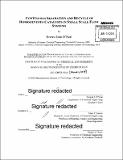Continuous separation and recycle of homogeneous catalysts in small scale flow system
Author(s)
O'Neal, Everett John
DownloadFull printable version (37.92Mb)
Other Contributors
Massachusetts Institute of Technology. Department of Chemical Engineering.
Advisor
Klavs F. Jensen.
Terms of use
Metadata
Show full item recordAbstract
The development of organometallic catalysts with high activity and selectivity has transformed the way both bulk and fine chemicals are produced. When such catalysts are applied in fine chemicals production, the presence of toxic heavy metals in these catalysts (Pd, Pt, Ru, Rh, etc.) can pose significant separation challenges. Regulatory bodies (such as the FDA and EMA) require that many popular catalytic heavy metals stay below 10 ppm in pharmaceutical drugs. Organic solvent nanofiltration (OSN) membranes are an upcoming technology with the potential to solve this problem by allowing heavy metal-containing catalysts to be molecularly separated from smaller product molecules. This size-based molecular separation makes the technique general, but challenges still exist in further broadening the chemical compatibility of nanofiltration membranes. Recent efforts have succeeded in creating membranes which are compatible with strong bases, and these membranes are applied in this thesis. The work in this thesis developed continuous catalyst recycle systems for a metathesis catalyst, a hydrogenation catalyst, and a palladium Buchwald-Hartwig amination catalyst. During the initial stages of designing such small scale catalyst recycle systems, significant technology gaps were identified. These included microfluidic OSN modules, microfluidic holding tanks with level sensing, milli-scale OSN modules with integrated high-pressure holding tanks and liquid level sensing, and a milli-scale holding tank with two-phase level sensing. These small scale process blocks were designed, built, and implemented in this work. Our metathesis catalyst recycle system included a reactor, holding tank, and nanofiltration module with a total internal volume of less than 3 ml. The system was used to automatically recycle the catalyst, obtaining a catalyst turnover number (TON) of 935, and reducing the ruthenium contamination in the product stream by a factor of 100. For our hydrogenation catalyst recycle system, we built a high-pressure small-scale catalyst recycle flow process (less than 50 ml). The system improved catalyst TONs from 500 to 4750, and reduced catalyst contamination in the product stream by a factor of 200. Finally, our palladium catalyst recycle system was able to perform a liquid-liquid separation before a nanofiltration step, and improved the TON of our reaction from 125 to 550 while decreasing the palladium contamination in the product stream by almost an order of magnitude. We also discovered significant disadvantages in operating these continuous systems, including reduced throughput due to membrane fouling, reduced catalyst activity due to product inhibition, reduced substrate concentrations in the recycle loop (leading to reduced reaction rates), enantioselectivity decline, and increased process complexity. This thesis contributes to understanding the advantages/disadvantages of OSN-containing catalyst recycle systems, provides new tools for future work in many areas involving small scale process design, and generates recommendations regarding the next generation of smallscale OSN pilot processes.
Description
Thesis: Ph. D., Massachusetts Institute of Technology, Department of Chemical Engineering, February 2015. Cataloged from PDF version of thesis. "October 2014." Includes bibliographical references (pages 183-189).
Date issued
2015Department
Massachusetts Institute of Technology. Department of Chemical EngineeringPublisher
Massachusetts Institute of Technology
Keywords
Chemical Engineering.